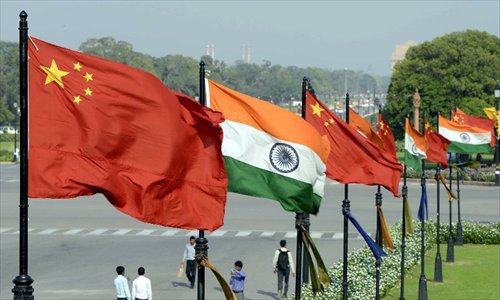HOME >> OP-ED
Sino-Indian cooperation is invaluable
Source:Global Times Published: 2014-9-17 0:28:02

Indian and Chinese national flags flutter side by side at the Raisina hills in New Delhi, India, on Sep 16, 2014. Chinese President Xi Jinping will arrive in India Wednesday for a state visit. Photo: Xinhua
Chinese President Xi Jinping arrives in India for a state visit Wednesday. This is the first time a Chinese president has traveled to India in the last eight years and Xi is the first leader of a major power to make the trip after the new Indian leadership assumed office.
His first stop is in Indian Prime Minister Narendra Modi's home state of Gujarat, in western India, on Modi's 64th birthday. Modi will welcome Xi in Ahmedabad, the largest city in Gujarat. This is viewed as a starting point for the two state leaders to develop a personal friendship.
When Modi visited Japan early this month, floods of rhetoric such as "joining hands to counter China," emanated from Japanese public opinion, to which Modi gave a rational response at the time. Now it seems that this mentality from many Japanese is very wide of the mark. New Delhi is committed to an independent foreign policy and it is a behemoth even Washington can hardly mobilize willfully, let alone Tokyo. This reflects India's diplomatic wisdom, in which its huge interests play a decisive role.
Friendly Sino-Indian cooperation is of enormous strategic value for India and such a relationship can in no way be replaced by its bilateral ties with any other country. The geopolitical significance of the benign development of Beijing-New Delhi ties can't be duplicated.
The friendship between these two big neighbors will constitute a fundamental condition for other diplomatic endeavors, especially true for India today. The better China-India relations develop, the more advantages and initiatives India can have when dealing with the US and Japan.
China has been regarded as their biggest rival by the US and Japan, who instinctively try to rope in China's neighbors to their cause. A positive New Delhi-Beijing engagement would force Washington and Tokyo to cozy up to India.
On the global strategic chessboard, Japan and India wield nearly the same influence. In contrast to Japan's openly hostile policy toward China, India follows a cooperative principle with China. Therefore, Japan has to seek the favor of India, not the other way around. In fact, the value diplomacy advocated by Tokyo is rather nonsensical and no country that Japan prefers would be stupid enough to follow it.
China has a long-term strategy to develop friendly cooperation with India, rather than seeking short-term gain. For us, the Sino-Indian relationship, with its own strategic merits, doesn't have to be associated with ties with other major powers. Rationality and vision dictate the development of bilateral ties.
Both China and India are continent-sized countries but have embarked on different paths and developed different advantages. We need to discover more of the common interests between the two countries which will have a stunning purchasing power upon humanity's future.
Posted in: Editorial